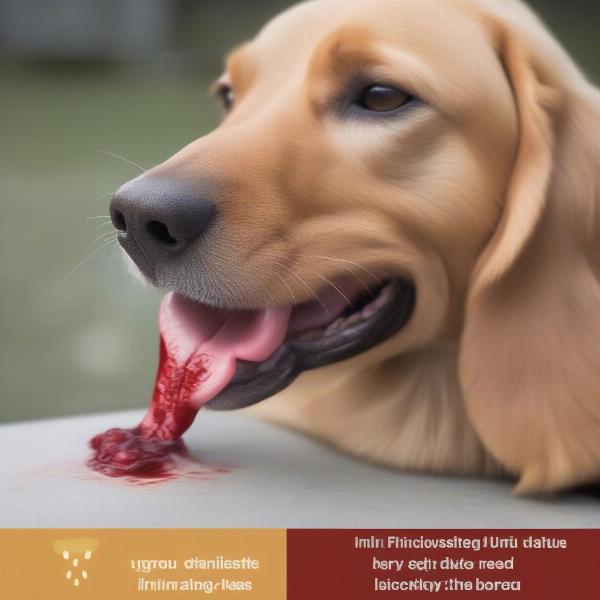Urinary care dog food plays a crucial role in maintaining a dog’s bladder health. Choosing the right urinary care dog food can be overwhelming with so many options available. This guide will help you understand the importance of urinary care dog food, what to look for, and how to make the best choice for your furry friend. We’ll cover everything from understanding the causes of urinary problems to selecting the right ingredients and transitioning to a new diet.
Urinary tract infections (UTIs) and other bladder issues are common in dogs. These issues can cause discomfort, pain, and even more serious health problems if left untreated. Dietary management, through specialized urinary care dog food, is a key component of both preventing and managing these conditions.
Understanding Urinary Problems in Dogs
Several factors can contribute to urinary problems in dogs, including genetics, diet, underlying medical conditions, and even the amount of water they drink. Common urinary issues include UTIs, bladder stones, and crystals in the urine. These issues can lead to frequent urination, painful urination, blood in the urine, and even urinary blockage, which is a life-threatening emergency.
 Symptoms of Urinary Tract Infections in Dogs
Symptoms of Urinary Tract Infections in Dogs
How Diet Impacts Urinary Health
A dog’s diet plays a significant role in maintaining urinary health. Certain minerals, such as magnesium, phosphorus, and calcium, can contribute to the formation of bladder stones and crystals. Urinary care dog food is formulated to control the levels of these minerals, helping to prevent crystal formation and promote a healthy urinary pH.
Choosing the Right Urinary Care Dog Food
When selecting a urinary care dog food, it’s essential to consider your dog’s specific needs, breed, age, and overall health. Consult your veterinarian for personalized recommendations.
Key Ingredients to Look For
Look for urinary care dog food that:
- Controls mineral levels: Reduced levels of magnesium, phosphorus, and calcium.
- Promotes a healthy urinary pH: A slightly acidic pH can help prevent the formation of struvite crystals, while a slightly alkaline pH can help prevent calcium oxalate crystals.
- Increases water intake: Added moisture or formulations that encourage water consumption can help dilute urine and flush out the urinary tract.
- Contains antioxidants: Antioxidants can help support overall urinary tract health.
- salmon oil dogs can be beneficial for overall health, but always consult your vet before adding supplements.
Types of Urinary Care Dog Food
Urinary care dog food is available in various forms, including dry kibble, wet food, and prescription diets. Your veterinarian can help you determine the best option for your dog’s individual needs. dog food for urinary crystals are specially formulated to dissolve existing crystals and prevent new ones from forming.
Transitioning to a New Diet
When switching to a new urinary care dog food, it’s important to do so gradually to avoid digestive upset. Mix the new food with your dog’s current food, gradually increasing the proportion of the new food over several days.
Conclusion
Choosing the right urinary care dog food is a crucial step in managing and preventing urinary problems in dogs. By understanding the causes of urinary issues, selecting a diet with the right ingredients, and working closely with your veterinarian, you can help your furry friend maintain a healthy and happy urinary tract. Remember to consult with your veterinarian for personalized advice and dog food tins options if needed.
FAQs
- What are the signs of a UTI in dogs? Frequent urination, straining to urinate, blood in the urine, and licking the genital area.
- Can I give my dog cranberry juice for a UTI? While cranberry juice is often recommended for humans, its effectiveness in dogs is debated. Consult your veterinarian before giving your dog any supplements or home remedies.
- How often should I feed my dog urinary care dog food? Follow the feeding guidelines on the product label and consult with your veterinarian.
- Is urinary care dog food expensive? The cost varies depending on the brand and type of food. synulox dose dogs should be administered only under vet supervision.
- Can all dogs benefit from urinary care dog food? No, urinary care dog food is specifically formulated for dogs with or at risk of urinary problems. If your dog is healthy, a standard, balanced diet is usually sufficient. It’s also important to consider factors like dog holding pee for 12 hours overnight when assessing urinary health.
- How long should my dog stay on urinary care dog food? This depends on your dog’s individual condition and should be determined by your veterinarian.
- What if my dog refuses to eat urinary care dog food? Try mixing it with their current food or warming it up slightly. If they continue to refuse, consult your veterinarian.
ILM Dog is a leading online resource for dog owners worldwide, providing expert advice on dog breeds, health, training, nutrition, grooming, and more. We offer practical tips and insights to help you provide the best possible care for your canine companion. From breed selection to senior dog care, ILM Dog is your trusted source for all things dog-related. Contact us at [email protected] or +44 20-3965-8624 for expert advice tailored to your dog’s needs.